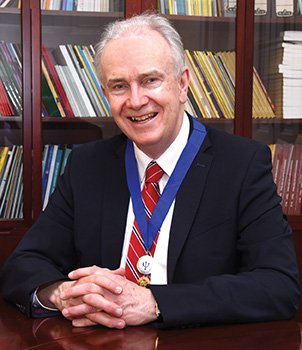Paul Mulholland previews the upcoming Spring Conference of the College of Psychiatrists of Ireland, which celebrates the College’s tenth anniversary
The 2019 Spring Conference of the College of Psychiatrists of Ireland ( CPsychI) is titled ‘Looking Back, Moving Forward’. The title of the conference, which takes place from 3- 5 April in the Castleknock Hotel, Dublin, was decided upon as it is 10 years since the formalisation of the College. On Thursday 4 April, the opening session of the conference looks at the College’s journey over the past decade. The Chief Executive of the College Ms Miriam Silke will provide an introduction to the conference and highlight some of the College’s achievements over the past ten years. After Ms Silke, Consultant Psychiatrist Dr Justin Brophy, the inaugural President of the College in 2009/10, will give his perspective on CPsychI’s journey, while Dean of the College Prof Greg Swanwick will talk about achievements in training. The session will end with the current President Dr John Hillery speaking about how the College can build upon these achievements in the coming years and meet future challenges.
Speaking to the Medical Independent, Dr Hillery said: “The College has done well at its core job, which is to train doctors and to make sure the rest of us are up-to-date with the latest evidence. For the first time in years we have oversubscription to our training schemes, which is great. We also have received positive feedback from those on our training schemes that they are good, and positive feedback from the membership about the positive events we run.

“But how do we keep that going at a time of continued cutbacks? We have become adept, to use that cliché, at ‘doing more with less’. That is something definitely we have been asked to do with training. There is a knock-on effect, however, in terms of the quality of services delivered to the public. And we have not been able to do things like setting up our inspection processes, because of financial pressures and getting people to do the inspections. So we need to build on what we are doing and make sure the standards stay high and that is nearly a full-time job at the moment. We are training more people for the same amount of money we were being given many years ago and it is hard to know if that is sustainable in the long run.”
Premature mortality and youth mental health
After the opening session, a talk will be given by Consultant Liaison Psychiatrist Dr Peter Byrne, Royal London Hospital, titled, ‘Premature mortality in severe mental illness: New solutions for an old problem that’s getting worse’.
This is a talk about the application of evidence-based public health, medical and psychiatric methods, including co-production with service users, to reduce the seven main drivers of premature deaths in people with severe mental illness.
Another talk will focus on ‘Youth mental health: A global challenge’. It will be delivered by Professor of Youth Mental Health, University of Melbourne, Australia, Prof Patrick McGorry. According to Prof McGorry, “one of the key reasons is the belated recognition that so much of the lost potential and economic damage that results from mental illness has to do with its timing in the life cycle”. The inclusion of mental health in the UN sustainable development goals, the creation of a global mental health movement and serious political and advocacy campaigns, plus the World Economic Forum’s support for mental health reform, have all highlighted youth mental health as a key focus. The design and scaling-up of new integrated youth mental health models of care in a growing number of countries has established a base camp for reform, for new research possibilities and for transformational change in mental healthcare.
These developments will be described and their relevance to Ireland will be discussed with the audience. The talk will be followed by a panel discussion.
Personality disorders and perinatal psychiatry
A large portion of the conference will be devoted to parallel sessions. These include: A discussion on advances in the Irish Psychosis Network; professional competence design; and media and communication training. One of the highlights of these sessions will be treating borderline personality disorders in the general adult setting.
Personality disorder is associated with high morbidity and mortality, having a major impact on health and society. There are no specialist personality disorder services in the Republic of Ireland. With this in mind, Consultant Psychiatrist, Galway University Hospitals Dr Evelyn McCabe, will give an introduction to assessing, formulating and treating borderline personality disorder with evidence-based treatment. She will present practical guidelines as to how general psychiatrists can deliver effective treatments in the non-specialised clinical setting.
Another interesting session will be a perinatal psychiatry workshop. The workshop will be delivered by psychotherapist Dr Catherine Hinds, the Maudsley, London, UK, who will discuss clinical management, risk assessment and prescribing in the perinatal period.
According to Dr Hinds: “I will give an overview of the model of care and scope of practice of the community perinatal mental health service in London, where I work. I will also give some context of the NHS England strategy for improving Perinatal Mental Health Services in the UK, where we are at and where we are heading over the next few years.”
The first talk the following day will be delivered by Senior Clinical Lecturer in the Institute of Neuroscience at Newcastle University, UK, Dr Marc Woodbury-Smith, who will speak about autism spectrum disorder (ASD) in adulthood.
“In this talk, I will describe the presentation of ASD in adulthood, including the potential overlap and confusion with related disorders impacting social interaction and communication,” according to Dr Woodbury-Smith.
“I will describe the common comorbidities and the service needs for this population, and give consideration to how existing services might work together to best meet the needs of this population.”
But how do we keep that going at a time of continued cutbacks? We have become adept, to use that cliché, at ‘doing more with less’. That is something definitely we have been asked to do with training. There is a knock-on effect, however, in terms of the quality of services delivered to the public
Social technologies
A session will be devoted to the impact of social technologies on the mental health and wellbeing of children and young people.
Cyberpsychologist and Adjunct Associate Professor at University College Dublin Prof Mary Aiken will discuss principal aspects of social technologies, from impact on physical and mental wellbeing, to environmental psychology of growing up in cyberspace, through to developmental, social and clinical implications regarding same. From the contentious screen-time debate, to devices and platforms that are actively designed to addict, she will discuss the challenges of existing and emerging forms of social media for children and young people, and importantly for child and mental health service clinicians, researchers and practitioners.
The provocative title of another talk is ‘Psychiatrists should all be clinical trialists’, which will be delivered by Professor of Old Age Psychiatry Prof Robert Howard, University College London, UK.
“In the autumn years of my career, I can’t help but reflect how little extra we have to offer our patients compared to when I joined the profession 30 years ago,” according to Prof Howard.
“While it is true that basic neuroscience knowledge has advanced, applications of this to mental health are often simplistic and add nothing to the treatment and care that we provide. There’s little glamour to clinical trials and scientists have traditionally looked down their noses at those who conduct them. Industry trials are complicated by understandable conflicts of interest. But academically-conceived and independently-conducted trials are a way that all of us can work to push forward knowledge about what works and what doesn’t. Irish psychiatry has a great track record in this area and you, and we, should do a lot more.”
Cannabis and psychiatry
The final two talks of the conference will be devoted to cannabis and psychiatry. Clinical Scientists Dr Marta Di Forti, the Maudsley, London, will talk about how heavy cannabis use contributes to the high rates of psychotic disorder in London and Amsterdam.
“I shall present today the first evidence from a European collaboration study that frequent cannabis use, and especially the use of high potency types contribute to explain variations in incidence rates of psychotic disorders across Europe,” according to Dr Forti.
In his talk, Professor of Psychiatric Research at the Institute of Psychiatry, King’s College London, Sir Robin Murray, asks whether psychosis can be prevented. Much effort to prevent psychosis focusses on outreach clinics for those with the “at-risk mental state”.
However, this approach will never reach more than a fraction of those at risk, according to Prof Murray. Instead, he will argue it is time to move towards universal primary prevention. In the absence of a marker to reliably identify those who will later develop psychosis, Prof Murray will state the obvious route is to diminish exposure to factors which increase the risk of psychosis; such an approach is common in medicine, ie, the reduction in smoking-related disorders achieved by campaigns about the risks of tobacco smoking.
“The best-established risk factors for psychosis are obstetric events, childhood adversity, migration, being brought up in a city, adverse life events and cannabis use,” according to Prof Murray.
Consultant in Old Age Psychiatry, Dublin North City, Dr Matthew Sadlier, will also talk about the social and political effects of cannabis use. A panel discussion will follow, which will ask would decriminalising cannabis use lead to increased rates of mental illness. According to Dr Hillery, the conference provides an opportunity for psychiatrists to gather together, network, form potential collaborations, and discuss a way forward for the specialty. CPD credits will also be given to attendees.













Leave a Reply
You must be logged in to post a comment.